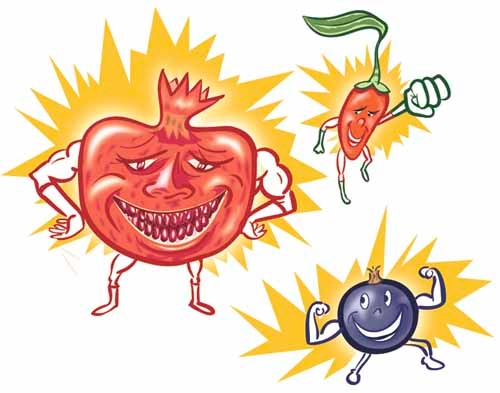EATING RIGHT: Super fruits are all the rage, but research is sparse

Z ach Sammons, herbalist at Herbally Grounded, has seen plenty of people come into the store at 4441 W. Charleston Blvd. in search of super fruits.
"I would say a lot of people for acai," Sammons said. "Goji berries, a lot of people come in for."
If you’ve been paying attention during the past couple of years, you’ve no doubt heard the names of such exotic fruits as acai and goji tossed around, as well as those of noni, rose hips and mangosteen. They are, in order, a South American berry, a Chinese berry, a Hawaiian fruit, the seedpod (or fruit) of roses and a tropical fruit from Indonesia. What they have in common is that many people believe they’re good for what ails you.
Acai, Sammons said, "promotes healthy weight loss, energy, vitality, digestion and fights free radicals." Goji berries are good for "anti-oxidants, anti-aging, stimulates cellular growth, increases longevity, helps balance sugar. People in different countries say that if you eat a handful a day, you live to 100," he said.
Interest in so-called super fruits started picking up about five years ago, thanks to attention from celebrities, Sammons said.
"Dr. (Mehmet) Oz has had acai on his show," he said. Oprah Winfrey’s website lists acai as one of the foods on "Dr. Oz’s Anti-Aging Checklist."
Then again, the same piece lists old-familiar blueberries as "one of his favorite anti-aging foods," and quotes, "blueberries lead the charge." (And the site links to a statement citing a 2009 trademark-infringement complaint by Harpo Inc., producers of Winfrey’s and Oz’s shows, against Internet supplement marketers, which was resolved in Harpo’s favor.)
So here we are, with the age-old question: Are the exotic new products — new to Americans, anyway — the panacea we’ve all been seeking? Or are we better off sticking with things we’ve known all of our lives?
Robyn Lew, a registered dietitian and community-based instructor with University of Nevada Cooperative Extension, remembers a senior-class project when she was at the University of Nevada, Las Vegas, a few years ago. Various super fruits, including acai, rose hips and blueberries, were studied.
"It was fairly conclusive across the board that the research is very shady in either direction," Lew said.
Mary Wilson, a registered dietitian and extension nutrition specialist with Cooperative Extension, takes a pragmatic view.
"The most important thing is getting Americans to eat more fruits and vegetables," Wilson said.
The super fruits, she said, certainly have their value.
"Some of these fruits do have some potential health benefits and are good sources of anti-oxidants and other properties," she said.
"By all means, incorporate those things into your diet," Lew said. "They’re not harmful to you; just remember moderation in all things."
But here’s the thing: When was the last time you saw these exotic fruits fresh in your neighborhood supermarket? And, Wilson said, the whole fruit is the only way to get all of the fruit’s nutrients. She pointed out that if you’re only drinking the juice, you’re not getting fiber, and you get calories more quickly (she recommends diluting with water). You also might be losing out on other nutrients.
The study of phytochemicals and anti-oxidants is a "young science," Wilson said.
"We don’t know all the different compounds and combinations that are found in fruits and vegetables," she said. "To be able to replicate that is hit and miss."
Supplements are hit or miss as well, she added. "It may not actually have much of what it is you think you’re getting in it."
And then there’s the cost factor.
"If you look at the comparison of how much supplements cost you and how much fruits and vegetables cost you, you’re going to be far ahead, cost-wise" with the latter, Wilson said. "And we know that research is true — the health benefits of eating fresh fruits and vegetables. That’s not always the case with supplements."
An example: One national chain advertised 60 acai capsules for $24.99 and recommended two capsules once or twice daily.
"Why spend $12 on a bottle of acai juice when you can buy blueberries at the store?" Lew asked.
"Certainly, if you have the money and you want to buy those, I think that’s your option," Wilson said. "But I think we have more cost-effective, affordable types of fruits and vegetables that can offer the same benefits."
Which brings us back to blueberries, which, Wilson said, are "very high in anti-oxidants, and affordable, especially at this time of year." They’re also a good source of vitamin C, potassium and fiber.
As a rule of thumb to determine which fruits are truly super for your health, consider their colors.
"We start to think of the more colorful fruits and vegetables," Wilson said. "They’re all going to offer something just a little bit different — red, such as strawberries, orangy ones such as papaya and mango and carrots. That’s why the Produce for Better Health (Foundation) people came out with ‘Eat the Rainbow,’ because you’re getting such a supply of nutrients."
Pomegranate and grape juice also have healthful qualities, she said.
This, for Lew, is the bottom line:
"It isn’t going to hurt you to have blueberries, or acai. By all means incorporate it into your diet — as long as you’re not drinking nothing but noni juice eight times a day and spending lots of money to do it. Certainly, it’s very good to have anti-oxidant-rich foods in your diet."
Contact reporter Heidi Knapp Rinella at hrinella@ reviewjournal.com or 702-383-0474.